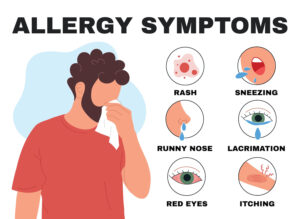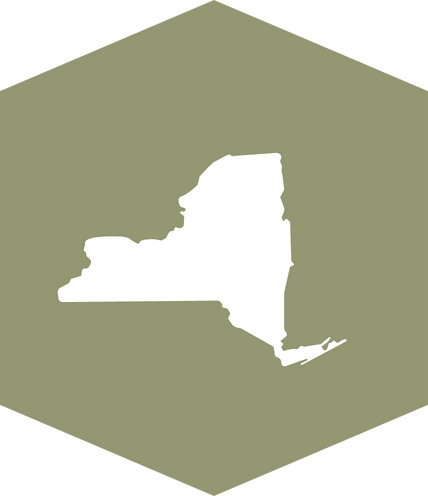Can You Be Allergic to Weed?
For so many people, including those we serve in our clinic with medical cannabis certifications so they can get their medical cannabis card, using cannabis to treat the symptoms of certain illnesses provides much-needed relief that they couldn’t find with traditional pharmaceuticals.
However, for some people, marijuana medicine isn’t an option because it produces adverse effects that negate the purpose of medical marijuana treatments.
Can You Be Allergic to Weed?
Why can some people use cannabis with no problems, but for others, using the plant can provide feelings of total misery?
In this article, we’ll break down the reasons why some people may be allergic to the marijuana plant, as well as talk about the condition called Cannabis Hyperemesis Syndrome, or CHS.
What a Marijuana Allergy Looks Like
Some people have allergies, whether they be seasonal environmental allergies, like to pollen; or food-related, like to peanuts; or related to other things in the environment around them, like to the fur of animals.
Cannabis is no different, and some people are actually allergic to cannabis, experiencing adverse effects and respiratory symptoms when coming into contact with it. Some people even may have a severe allergic reaction.
It has actually been observed that people who have food allergies like to grapefruit, peaches, tomatoes, bananas, citrus, eggplant, almonds, and chestnuts may also have an allergy to cannabis, as they are considered to have cross-reactivity because the proteins in these foods resemble marijuana proteins.
Symptoms of Marijuana Allergy
Those who have cannabis sativa allergy may have it manifest or show up in different ways, including, but not limited to:
· Nasal rhinitis aka. nasal congestion, runny nose, sneezing, and itching in the eyes, nose or throat;
· Eye allergy symptoms in the form of allergic conjunctivitis, or swelling of the eyelids and inflammation in the whites of the eyes;
· Asthma symptoms, wheezing, or trouble breathing;
· Skin reaction with hives, itching, redness, rash, or dry and patchy skin;
· Drug eruption, or a skin rash that develops as a reaction to some drugs or medications;
· Anaphylaxis symptoms, or anaphylactic shock, when there is a severe allergy.
Most marijuana allergy symptoms may occur with contact secondhand exposure with cannabis in any way, including through secondhand inhalation or marijuana smoke, through skin contact (contact dermatitis), airborne allergens, or by smoking marijuana or consuming edibles.
Some people may even experience an allergic response when using CBD oil.
Why Allergic Reactions to Cannabis Occur
Many times in our patient education series, we have talked about the importance of the Endocannabinoid System in cannabis medicine.
The endocannabinoid system is the regulator of all bodily systems, however when someone is severely allergic to marijuana, one system overrides the endocannabinoid system, and that is the immune system.
Allergies occur when this incredible bodily system detects something within, entering, or near your body that it perceives as harmful.
Acting as the body’s ultimate defense mechanism, the immune system wants those potentially harmful invaders out of the body and will go on to produce antibodies to make your body react and trigger symptoms.
This is why someone with pollen allergies may sneeze in the springtime because the immune system sees pollen as harmful and will produce antibodies and release chemicals like histamines that make you sneeze. In other words, allergies happen when your body thinks something is a harmful invader.
An article from 2007 called “sensitization to Cannabis sativa caused by a novel allergenic lipid transfer protein, Can s 3” also proposes that there may be a specific protein within cannabis that causes a severe reaction.
Allergies can actually be hereditary or be caused by changes in the environment around someone, or to their internal immune system. Allergies aren’t necessarily curable, but they can be treated with medications like anti-inflammatories or antihistamines.
What Causes Cannabis Allergies?
In cannabis, it hasn’t been totally isolated what part of the plant causes the allergic sensation, but it is believed to be from components of the pollen of cannabis and the smoke.
It’s not believed that cannabinoids like THC or CBD within the cannabis plant are allergens in themselves.
Cannabis Hyperemesis Syndrome (CHS): A Cannabis Allergy?
It wasn’t until the early 2000s that Cannabis Hyperemesis Syndrome, or Cannabinoid Hyperemesis Syndrome had a name put to it after it was found that some frequent cannabis users were experiencing severe bouts of vomiting.
In 2004, an Australian study looked at the correlation between Cyclical Vomiting Syndrome and long-term cannabis use, concluding that cannabis caused vomiting in most cases under study.

Researchers also saw that people who were frequently and severely vomiting were experiencing abnormal levels of bathing, with the belief that hot water would alleviate their symptoms.
Symptoms of CHS
When someone may start feeling the symptoms of Cannabis Hyperemesis Syndrome, it usually begins with morning sickness and chronic nausea that may start years or months before any chronic vomiting occurs.
Once the condition worsens, persistent vomiting, nausea, abdominal pain dehydration, and a compulsion to habitually bathe to relieve symptoms are common outcomes.
The only way to find relief from Cannabis Hyperemesis Syndrome is to cease use.
This condition is not without its naysayers, however, and those who live with it will often be faced with denial from the cannabis industry who doesn’t believe cannabis can cause negative effects.
Those who deny that Cannabis Hyperemesis Syndrome exists posit that the condition has been made up to deter cannabis use in increasingly legalized times, or that it’s not the actual plant that is causing the symptoms, but exposure to chemicals, soil nutrients, or pesticides.
Is There Allergy Testing for Cannabis?
Testing for marijuana allergies typically involves a combination of medical history evaluation, physical examination, and specific diagnostic tests.
When visiting your doctor to discuss whether you have an allergy to cannabis, your doctor will ask you about your symptoms, and the circumstances or methods of consumption that led you to have an allergic reaction to cannabis. They may also inquire about your personal and family medical history to rule out other possible causes for your symptoms.
To determine the presence of a cannabis allergy, your doctor may also perform a skin test. Skin prick tests or patch tests are commonly used to test for severe to mild allergic reactions. In a skin prick test, small amounts of cannabis pollen are applied to your skin through a small needle prick. If you are allergic, you may develop a localized allergic reaction, such as redness, swelling, or itching at the site of the test. Patch tests involve applying a patch containing marijuana extracts to your skin for a specified period and observing any reactions.
Less commonly used to determine an allergy to cannabis plants are blood tests that will measure the levels of antibodies produced in response to cannabis allergens, however, skin tests are the most common.
If you are seriously concerned about a possible allergy to marijuana products, or you are experiencing severe symptoms, we recommend that you consult with an allergist or immunologist who specializes in allergies to get an accurate diagnosis. They will guide you through the appropriate testing methods based on your medical history and symptoms and may give you some tips to treat symptoms of cannabis allergy.
What Do You Do if You Have Marijuana Allergy Symptoms?
If you are experiencing negative effects from cannabis, make sure you reach out to Compassionate Clinics of America to discuss with the doctor who provided you your medical cannabis certification.
Your doctor will help you determine if or any negative reactions you’re having with cannabis, and why. They may also suggest, if the symptoms are more negative than the positive outcomes of using cannabis, that all cannabis use is completely ceased and alternative treatments are considered. There is no specific marijuana allergy treatment as of yet and the only way to prevent symptoms is to cease marijuana use. Your doctor may also give you some allergy medications to try if the symptoms are not severe.
Cannabis allergy, and Cannabis Hyperemesis Syndrome, are both rare, but something we have to consider when recommending medical cannabis to our patients.
Is Cannabis Medicine Right for You?
While we do believe in the tenets of cannabis medicine and have seen so many of our patients’ lives change because of it, it is not for everyone.
Reach out to us at Compassionate Clinics of America if you live in Arizona, Arkansas, California, Connecticut, Delaware, Georgia, Illinois, Iowa, Louisiana, Maine, Maryland, Massachusetts, Michigan, Minnesota, Missouri, Montana, Nevada, New Jersey, New York, Ohio, Oklahoma, Pennsylvania, Texas, Utah, Vermont, Virginia, & West Virginia,, and discuss whether cannabis medicine is right for you.
Make sure you stay tuned to our patient education series as we continue to release valuable information about cannabis medicine that is intended to help our patients make the most of their experience with the powerful plant.

























